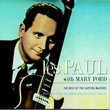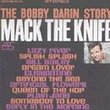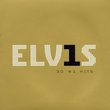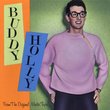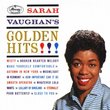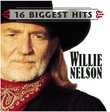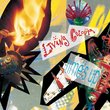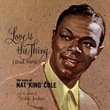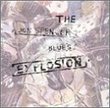| All Artists: Bob Wills & His Texas Playboys Title: King of Western Swing: 25 Hits (1935-45) Members Wishing: 2 Total Copies: 0 Label: Asv Living Era Original Release Date: 4/21/1998 Release Date: 4/21/1998 Genres: Country, Pop Styles: Classic Country, Western Swing, Singer-Songwriters Number of Discs: 1 SwapaCD Credits: 1 UPC: 743625525021 |
Search - Bob Wills & His Texas Playboys :: King of Western Swing: 25 Hits (1935-45)
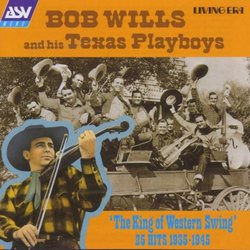 | Bob Wills & His Texas Playboys King of Western Swing: 25 Hits (1935-45) Genres: Country, Pop
|
Larger Image |
CD DetailsSimilarly Requested CDs
|
CD ReviewsColumbia hang your head in Shame Tony Thomas | SUNNY ISLES BEACH, FL USA | 12/11/2003 (5 out of 5 stars) "Columbia and its leasees have been reissuing recordings Bob Wills did with them in various aggregations since the mid 1970s when they let loose the original Bob Wills Anthology. Since then they have been putting out various combinations of the stuff from their years (1936-1946)in a way that if you went with them and bought this record or one of its peers, you would end up having three or four copies of some of the key recordings just to have all the best stuff. Yet, the music is worth it. Of course you can go upscale and get the Bear Family Box and other compilations. This CD has some great stuff that isn't on the anthology and some of the other collections as well as stuff that isn't. Most of the good stuff on this record is from the pre-WWII band. During the war the Playboys went through a lot of changes. Tommy Duncan joined the navy the day after war started. Wills himself was drafted. Wills showed up for the Army with his chauffer, his Cadillac limousine, and fretted about being woken up before 9 a.m. or doing anything that would roughen his fiddle playing hands! Wills was allowed to quit the army--something almost no one else was allowed to do during WWII--after he agreed to raise a lot of money for War bonds. Leon McAuliffe who had learned to fly working for Wills who had his own plane to fly the Playboys around in, became a flight instructor for the military. Etc. Etc. During the War itself Wills fronted the largest and according to those who heard it--it was never recorded due to the various recordinjg bands and vinyl shortages during the war--most beautiful big band aggregation he ever had. However, the band tended to shift to a group dominated by fiddles, and a trio with steel guitar, guitars, and tiny moore and later Johnny Gimble's electric mandolin with only one horn. This is the band you hear on the Tiffany transcriptioons which were all made in 1946 and 1947. I would also not dismiss the MGM years that followed the Columbia contract from the late 1940s into the mid 1950s. MGM has come out with a complete collection of Wills in those years, entitled The Boot Hill Drag, which has some of the hottest swingingest music ever made. And the stuff Wills recorded in the very late 1950s and early 1960s for Liberty with the return of Tommy Duncan and Joe Holley were as good as anything recorded in the 1930s or 1940s though it had a cleaner, jazzier, sound and even featured Vicki Carr singing backup on some numbers. If you like fiddle choirs, you will like some of the Liberty Tunes where Wills rounded out his own fiddle sections with a violist out of the Lawrence Welch Orchestra! To be sure, if you don't have any Bob Wills Music this is as good as any set to start with. The music is good enough for you to chase after it. This is Wills from 36 to 46 basically. Then you just get all the rest. The man kept making music until 1973. You really need it all!" Best one-volume CD available Jason E. Rimmer | Annandale, VA United States | 01/26/2002 (5 out of 5 stars) "Leave it to the British to offer the best one-stop shopping for Bob Wills fans. Unless you have the money to buy all 9+ CDs in the Tiffany Transcriptions...this is it." Ten years in the evolution of western swing . . . Ronald Scheer | Los Angeles | 01/02/2005 (5 out of 5 stars) "Western swing fans who know its full-fledged big-band sound of the 1940s will enjoy tracing its emergence from country jazz and blues and its migration from Texas to California in this terrific collection of early recordings by Bob Wills. The CD kicks off with the band's biggest western swing hit, "New San Antonio Rose" and then jumps back to their first recording, "Osage Stomp" (a rough and ready tune that's part barn dance and part Dixieland). The following six songs, all recorded in 1936, branch out from this into delta blues and rags, all with a country flavor, Wills' characteristic encouragements to the band and trademark "Ah-haaa."
The swing-band sound predominates starting with the 1938 recordings ("Whoa Baby," track 8) at a time when the band grew to 18 members. There follow some great standards, "Corrine, Corrina" (1940), "Take Me Back to Tulsa" (1941), "You're From Texas" (1942), and "Stay a Little Longer" (1945). Among the songs are vocals by young Tommy Duncan (born 1911) and younger Leon McAuliffe (born 1917), whose clear, mellow voices ring bright and sweetly smooth. Many songs are also graced by the sound of McAuliffe's wonderful steel guitar. A short booklet with this CD recounts the career of Bob Wills and his band. For each of the 25 tracks, the notes identify the location and date of recording (tracks 1-15 in Texas; tracks 16-25 in Hollywood). With 70 minutes of music, this CD is a great value. " |

 Track Listings (25) - Disc #1
Track Listings (25) - Disc #1